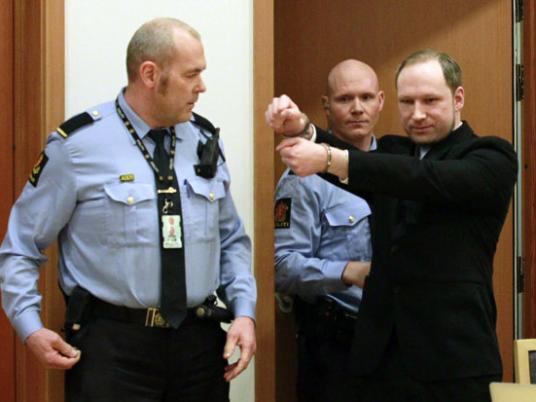
The long-awaited trial of right-wing extremist Anders Behring Breivik, who massacred 77 people in twin attacks in Norway last July, began Monday with proceedings set to focus on whether or not he is sane.
The trial opened amid tight security and massive media attention at the Oslo District Court at 9 am, with the first day's proceedings expected to focus mainly on a run-through of the charges and technicalities of the trial as well as on Breivik's plea.
Breivik made a far-right salute as he entered the Oslo district courtroom.
Police ushered the defendant, who was wearing a black suit and had his blond hair shortly cropped, to his seat at the front of the courtroom, under the gaze of survivors and family members of those he killed and hundreds of journalists from around the world.
Shortly after proceedings began, Breivik told the Oslo District Court that he did not recognize its legitimacy.
While he has confessed to the deadliest attacks in post-war Norway, his lawyers have said he will enter a plea of "not guilty."
Breivik has described his actions as "cruel but necessary" and claims he acted alone and in self-defense against those he considered to be "state traitors" for opening Norway up to multiculturalism and allowing the "Muslim invasion" of Europe.
The main issue of contention during the 10-week trial will revolve around whether he is criminally sane and accountable for his actions, which will determine if he is to be sentenced to prison or a closed psychiatric ward.
A first court-ordered psychiatric exam found him insane, while a second opinion came to the opposite conclusion.
On 22 July, Breivik killed eight people when he set off a bomb in a van parked at the foot of government buildings in Oslo housing the offices of Labour prime minister Jens Stoltenberg, who was not present at the time.
He then traveled to Utoeya island outside Oslo where, dressed as a police officer, he spent more than an hour methodically shooting at hundreds of people attending a Labour Party youth summer camp.
The shooting spree left 69 people dead, most of them teenagers trapped on the small heart-shaped island surrounded by icy waters, and is the deadliest massacre ever committed by a sole gunman.
Breivik, 33, has been charged with "acts of terror" and faces either 21 years in prison — a sentence that could thereafter be extended indefinitely if he is still considered a threat to society — or closed psychiatric care, possibly for life.
The confessed killer wants to be found sane and accountable for his actions, so that his anti-Islam ideology, as presented in the 1,500-page manifesto he published online just before the attacks, will be taken seriously and not considered the ravings of a lunatic.
He has said that court-ordered psychiatric care would be "worse than death."
During the trial, "he will not only defend [his actions] but will also lament, I think, not going further," Breivik's main defense lawyer Geir Lippestad said last week.
Vibeke Hein Baere, another defencs lawyer, told TV2 Nyhetskanalen Sunday her client was preparing for his testimony, which is set to begin Tuesday, and was jotting down notes, but insisted he would not be allowed to make an ideological speech to the court.
The court has nonetheless banned television broadcasts of his testimony.
The five judges will have to consider the two contradictory psychiatric evaluations presented to the court, and determine whether he is sane and accountable when they hand down their verdict sometime in July.
The massacre shocked normally tranquil Norway, home of the Nobel Peace Prize, sparking emotional displays of national unity and a deep reflection on the delicate balance between openness and security.
"On 22 July, it was our democracy that was attacked," Prime Minister Jens Stoltenberg told news agency NTB recently, stressing: "It is therefore more important than ever to show that our democracy and rule of law work."
The size of the trial is unprecedented in the Scandinavian country.
The proceedings in the specially-adapted Oslo District Court will be broadcast live to 17 local courthouses around the country to accommodate more than 770 survivors and families of victims figuring as plaintiffs.
Police have cordoned off numerous streets around the courthouse, which has been beset by media organizations from around the world, with some 800 reporters from around 210 media organizations set to follow the case.




